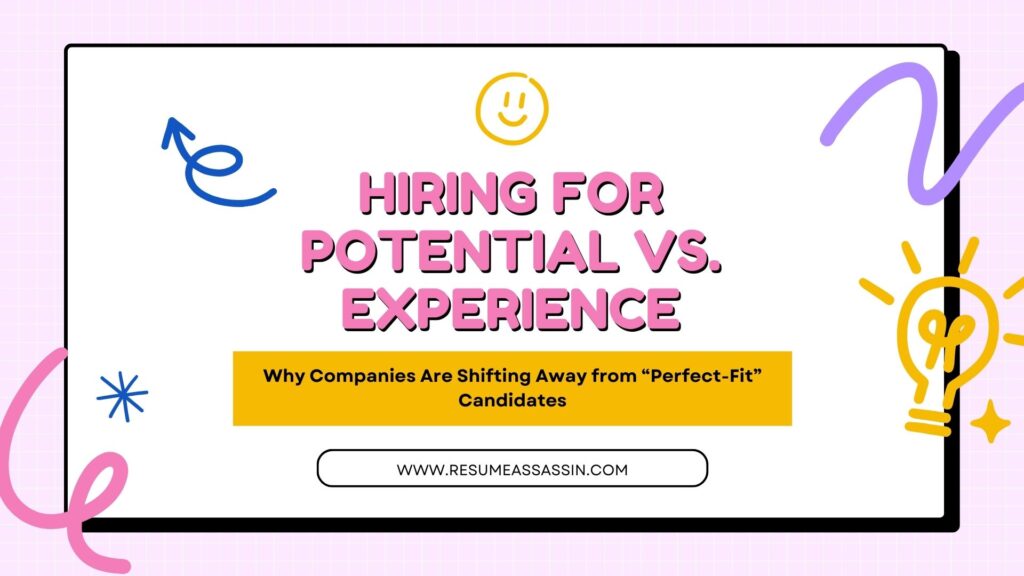
For decades, companies have relied on a rigid hiring model—seeking candidates with the right degrees, years of experience, and industry-specific skills. However, a fundamental shift is occurring in the job market. More organizations are prioritizing potential over experience, recognizing that adaptability, problem-solving skills, and a willingness to learn often outweigh a perfect resume.
1. The Limitations of Experience-Based Hiring
Traditionally, experience has been the gold standard in hiring decisions. Employers believed that candidates with a proven track record in a similar role would require less training and ramp-up time. While this approach may have worked in stable industries, it often stifles diversity, innovation, and long-term adaptability. Hiring solely based on experience can exclude high-potential candidates who have the skills and mindset to excel but may lack direct industry experience.
Another downside of experience-based hiring is its tendency to perpetuate a narrow talent pool. When companies prioritize only those with years of experience in a particular role or industry, they limit access to fresh perspectives and innovative thinking. This approach can lead to stagnation, with teams recycling the same ideas rather than evolving with changing market conditions.
2. The Rise of Skills-Based and Growth Mindset Hiring
Companies are realizing that technical skills can be taught, but attributes like resilience, curiosity, and problem-solving are harder to instill. Organizations are shifting their focus to skills-based hiring, looking beyond traditional credentials and instead assessing candidates’ ability to learn and adapt. This shift has been fueled by rapid technological changes, the rise of AI, and the need for agile workforces that can evolve with industry demands.
Hiring based on a growth mindset means identifying candidates who demonstrate a strong ability to acquire new skills, think critically, and embrace challenges. Research shows that employees with a growth mindset are more engaged, take more initiative, and contribute to an organization’s long-term success. This shift encourages companies to focus on soft skills such as communication, leadership, and adaptability—qualities that are essential in today’s fast-changing business environment.
3. The Benefits of Hiring for Potential
Greater Innovation
Candidates with diverse backgrounds bring fresh perspectives that challenge the status quo. When employees come from various industries, they introduce new ideas and problem-solving approaches that may not be considered in a homogenous team. This diversity of thought leads to greater creativity and more effective solutions to business challenges.
Increased Employee Loyalty
When companies invest in growth and development, employees feel valued and stay longer. Providing opportunities for professional development creates a workplace culture that fosters learning and career advancement. Employees who see a clear path for growth within an organization are more likely to be engaged and committed, reducing turnover rates and boosting morale.
Improved Agility
Adaptable employees can pivot quickly in response to industry changes, making organizations more resilient. Businesses operating in fast-moving industries such as technology, healthcare, and finance need teams that can embrace change and continuously upskill. Hiring for potential ensures that employees can evolve alongside the company’s needs rather than becoming stagnant in their roles.
4. How Companies Are Implementing This Shift
Competency-Based Interviews
Rather than focusing on past job titles, interviews now emphasize problem-solving, critical thinking, and learning agility. Candidates are assessed on their ability to tackle real-world challenges, navigate uncertainty, and demonstrate flexibility in their approach to work. Behavioral and situational questions help employers gauge a candidate’s ability to adapt and grow within a role.
Apprenticeship and Training Programs
Many companies are investing in upskilling initiatives, ensuring that candidates with potential have the resources to succeed. These programs provide hands-on experience and mentorship, allowing employees to develop the necessary technical and professional skills while on the job. Organizations like Google, Accenture, and IBM have introduced training and apprenticeship programs designed to nurture talent rather than rely solely on traditional qualifications.
Removing Degree and Experience Requirements
Some organizations, including major tech firms, have eliminated strict degree and experience prerequisites in favor of skills-based assessments. By prioritizing skills over credentials, companies are opening doors to a wider pool of talent, including self-taught professionals, career changers, and individuals from non-traditional backgrounds. This approach fosters inclusivity and ensures that hiring decisions are based on ability rather than arbitrary requirements.
Conclusion
The shift from experience-based hiring to hiring for potential is reshaping the job market. Companies that embrace this approach are not only future-proofing their workforce but also fostering a culture of continuous learning and innovation. In an era where change is the only constant, the ability to adapt and grow is becoming the most valuable skill of all.
Employers who prioritize potential over past experience will benefit from a workforce that is dynamic, diverse, and equipped to navigate the complexities of the modern business landscape. As industries continue to evolve, companies that cultivate talent based on ability, mindset, and adaptability will gain a significant competitive advantage. The future of hiring is no longer about finding a “perfect fit”—it’s about investing in people who have the potential to grow into the role and beyond.
Ready to update your resume and optimize your LinkedIn profile?
Reach out today! www.resumeassassin.com or mary@resumeassassin.com
Connect on LinkedIn: www.linkedin.com/in/mary-southern
Schedule a 15 Minute Call: https://calendly.com/resumeassassin/meet
